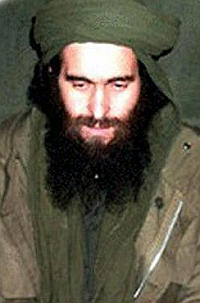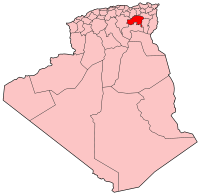
Nabil Sahraoui, alias Mustapha Abou Ibrahim, was an Algerian Islamist militant, and the head of the radical Groupe Salafiste pour la Prédication et le Combat from August 2003 until his death the following year.
The Salafist Group for Preaching and Combat, known by the French acronym GSPC, was an Algerian terrorist faction in the Algerian Civil War founded in 1998 by Hassan Hattab, a former regional commander of the Armed Islamic Group (GIA). After Hattab was ousted from the organization in 2003, the group officially pledged support for al-Qaeda, and in January 2007, the group officially changed its name to the "Al-Qaeda Organization in the Islamic Maghreb" (AQIM).
The Insurgency in the Maghreb refers to Islamist militant and terrorist activity in the Maghreb and Sahel regions of North Africa since 2002. The conflict succeeded the conclusion of the Algerian Civil War as the militant group Salafist Group for Preaching and Combat (GSPC) allied itself with al-Qaeda to eventually become al-Qaeda in the Islamic Maghreb (AQIM). Algeria and other Maghreb states affected by the activity have been offered assistance in fighting extremist militants by the United States and the United Kingdom since 2007, when Operation Enduring Freedom – Trans Sahara began.
The 2007 Dellys bombing occurred on September 8, 2007, when at least 30 people were killed and 47 injured in a suicide car bomb attack on an Algerian naval barracks in the town of Dellys, 100 km (62 mi) east of Algiers. The blast was carried out by two attackers who killed themselves in the attack. Al Qaeda's north Africa wing said it was behind the suicide attack.

The 2007 Batna bombing took place on 6 September 2007 in Batna, a town in Batna Province, eastern Algeria.
Sofiane el-Fassila, also known as Harek Zoheir حارك زهير, served as the second-in-command of Al Qaeda in North Africa until Algerian security forces killed him.

There were two near simultaneous bombings in Algiers which occurred on 11 December 2007 when two car bombs exploded 10 minutes apart starting at around 9:30 a.m. local time, in the Algerian capital Algiers. The al-Qaeda Organization in the Islamic Maghreb has claimed responsibility for the attacks, stating that it was "another successful conquest […] carried out by the Knights of the Faith with their blood in defense of the wounded nation of Islam." These attacks constitute another act of violence in the ongoing Islamic insurgency, a continuation of the Algerian Civil War that has claimed 200,000 lives.

Abdelmalek Droukdel, also known by his nom de guerre as Abu Musab Abdel Wadoud, is the emir, or leader, of the Algerian Islamic militant group Al-Qaeda in the Islamic Maghreb (AQIM), formerly the Salafist Group for Preaching and Combat (GSPC).
Events from the year 2007 in Algeria.
Al-Qaeda has conducted operations and recruited members in Africa. It has included a number of bombing attacks in North Africa and supporting parties in civil wars in Eritrea and Somalia. From 1991 to 1996, Osama bin Laden and other al-Qaeda leaders were based in Sudan.

The international activities of Al-Qaeda includes involvements in Europe, where members of the group have been involved in militant and terrorist activities in several countries. Al-Qaeda has been responsible for or involved in attacks in Western Europe and Russia, including the 2004 Madrid train bombings, 2010 Moscow Metro bombings, 2011 Domodedovo International Airport bombing, and the January 2015 Île-de-France attacks.
Events from the year 2009 in Algeria
Events from the year 2010 in Algeria

Al-Qaeda in the Islamic Maghreb, or AQIM, is an Islamist militant organization which aims to overthrow the Algerian government and institute an Islamic state. To that end, it is currently engaged in an anti-government campaign.
The Movement for Oneness and Jihad in West Africa or the Movement for Unity and Jihad in West Africa, was a militant Islamist organisation that broke off from Al-Qaeda in the Islamic Maghreb with the intended goal of spreading jihad across a larger section of West Africa.

Mokhtar Belmokhtar, also known as The One-Eyed, Nelson, The Uncatchable, is an Algerian leader of the group Al-Murabitoun, former military commander of Al-Qaeda in the Maghreb, smuggler and weapons dealer. He was twice convicted and sentenced to death in absentia under separate charges in Algerian courts: in 2007 for terrorism and in 2008 for murder. In 2004, he was sentenced to life imprisonment in Algeria for terrorist activities.

Abdelhamid Abou Zeid was an Algerian national and Islamist jihadi militant and smuggler who, in about 2010, became one of the top three military commanders of al-Qaeda in the Islamic Maghreb (AQIM), a Mali-based militant organization. He competed as the chief rival of Mokhtar Belmokhtar, an Algerian national who had become the major commander in AQIM and later head of his own group. Both gained wealth and power by kidnapping and ransoming European nationals. After taking control of Timbuktu in 2012, Abou Zeid established sharia law and destroyed Sufi shrines.

Al-Mourabitoun was an African militant jihadist organisation formed by a merger between Ahmed Ould Amer, a.k.a. Ahmed al-Tilemsi's Movement for Oneness and Jihad in West Africa and Mokhtar Belmokhtar's Al-Mulathameen. In 4 December 2015, it joined Al-Qaeda in the Islamic Maghreb (AQIM). The group seeks to implement Sharia Law in Mali, Algeria, southwestern Libya, and Niger.

The Islamic State of Iraq and the Levant – Algeria Province, or ISIL-AP, is a branch of the militant Islamist group Islamic State of Iraq and the Levant (ISIL), active in Algeria. The group was formerly known as Jund al-Khilafah fi Ard al-Jazair.
Al-Mulathameen Brigade was a terrorist militant organisation active in North and West Africa founded and led by Mokhtar Belmokhtar who was previously a member of Al-Qaeda in the Islamic Maghreb. In 2013 Al-Mulathameen merged with Movement for Oneness and Jihad in West Africa to form Al-Mourabitoun. In 2017 Al-Mourabitoun merged with the Saharan branch of Al-Qaeda in the Islamic Maghreb, Ansar Dine, and Macina Liberation Front to form Jama'at Nasr al-Islam wal Muslimin.








